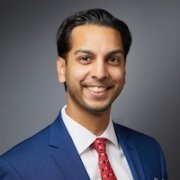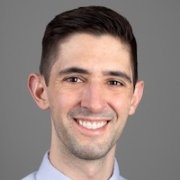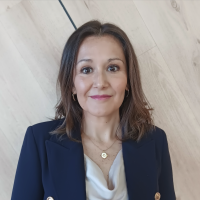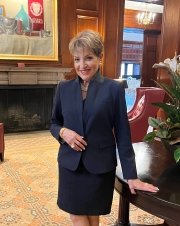Training to Teach in Medicine
- Certificate Program

Gain the skills to teach and inspire future health care professionals using innovative, evidence-based strategies in diverse learning settings.
- Live Online
This program requires attendance at two virtual workshops.
Certificate
Additionally, this program offers Continuing Education credits and HMS Associate Member status.
Seven Months, 2 Required Workshops, 7-10 Hours/Week
In between workshops, you will spend time viewing pre-recorded materials, attending live online lectures, reviewing sessions with faculty, and working on team assignments and your capstone.
On This Page
Overview
To effectively prepare the next generation of health care professionals, today’s medical educators must embrace innovative teaching strategies for both classroom and clinical settings.
Training to Teach in Medicine is a seven-month, online certificate program designed for clinician-educators, instructors, and faculty around the world. Taught by distinguished Harvard Medical School faculty, the program blends traditional and modern teaching approaches through interactive online modules, skills-based training, team and individual projects, two live virtual workshops, and a final capstone project designed to benefit your home institution.
This curriculum empowers participants to apply educational theory and best practices to train medical students and physicians-in-training —ultimately strengthening the quality and impact of the future medical workforce. Participants of the program will leave with practical skills, proven strategies, and effective techniques for educating adult learners in a variety of academic and clinical environments.
Workshop 1
- November 12–14, 2026
- Location: Live Online
Workshop 2 and Completion Ceremony
- June 10–13, 2027
- Location: Live Online
Learning Objectives
- Gain the skill sets, techniques, and strategies to design a highly engaging, interactive educational curriculum for your home institution
- Understand the process of adult learning and how it should impact medical education
- Master small group teaching and case-based collaborative learning
- Apply the principles of curriculum development to classroom, clinical, and remote-learning settings
- Recognize and implement the necessary elements for successful curriculum reform
- Integrate simulation and modern technology to enhance teaching and learning
- Become a more effective and committed advisor who knows how to guide and inspire others
- Develop a network of like-minded clinical educators from around the world
- Optimize evaluations and assessments and provide more productive feedback
- Apply the core ethical principles of medical education research to classroom and clinical teaching
- Understand underlying theory from a conceptual perspective, incorporating learning sciences and other justifications for the content
About the Program
Training to Teach in Medicine develops essential skills while guiding learners in their exploration of modern medical education pedagogy and innovative teaching techniques. Our scholars, both early-career and seasoned educators, will enhance their knowledge of medical education.
Upon program completion, participants will:
- Master evidence-based justifications for critical clinical education skill sets. Through the study of educational theories, scholars will leave the program with a framework to educate medical learners in practice
- Learn and apply practical teaching skills to diverse groups of adult learners in bedside, ambulatory, classroom, and other settings
- Accelerate leadership and professional development in medical education pedagogies and teaching techniques
Program Format
This program has two required live online workshops. In between each workshop, participants should expect to spend an average of 7-10 hours per week on other coursework, which can include live webinars, pre-recorded lectures, readings, team work, or capstone related assignments.
Who Should Apply
This program is for highly motivated faculty, lecturers, and instructors engaged in medical education seeking to develop effective classroom and clinical teaching skills.
Clinicians, pharmacists, nurses and nurse practitioners, physician assistants, dentists, or other health care professionals teaching medical education are welcome to apply.
Candidates for the program should hold a doctoral-level degree, such as: an MD, PhD, MBBS, MBChB, DNP, DMD, DDC, or PharmD.
What You Earn
Learners who complete the program requirements will earn a Certificate of Completion. After completing the Training to Teach in Medicine program, you will be part of a global cohort of health care leaders and earn a certificate of completion from Harvard Medical School. You will become an integral part of a worldwide network of past participants of Harvard Medical School’s professional, corporate, and continuing education programs and courses. You will also be able to join the Harvard Alumni Association (HAA) as an associate member and become a part of an active global network connecting with and supporting each other, facilitating lifelong learning, growth, and success.
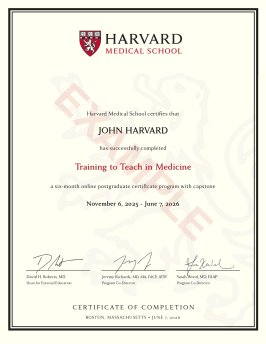
Program Faculty and Teaching Team
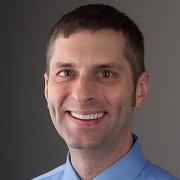
Jeremy Richards
MD, MA, FACP, ATSF
- Faculty Co-Director, Training to Teach in Medicine
- Chair of the Department of Medical Education, Mount Auburn Hospital
- Designated Institutional Official, Mount Auburn Hospital
- Core Faculty in Homeostasis I, Harvard Medical School
- A member of the Mount Auburn Hospital and Beth Israel Deaconess Medical Center faculty, Division of Pulmonary, Critical Care, and Sleep Medicine
Sarah K. Wood
MD, FAAP
- Director of the Harvard Macy Institute
- Program Co-Director, Program for Educators in Health Professions
- Faculty Co-Director, Training to Teach in Medicine
- Director of Translational Sciences, IllinoisCOM
- Associate Professor of Medicine, The Chicago School
- Associate Director, Training to Teach in Medicine, Harvard Medical School
- Practicing Hospital Medicine Physician, Beth Israel Deaconess Medical Center
- Clinical Instructor, Harvard Medical School
Andrew Jacobs Eyre, MD
Instructor in Emergency Medicine, Department of Emergency Medicine, Brigham and Women's Hospital
Jason A. Freed, MD
Assistant Professor of Medicine, Division of Hematology/Oncology Hematology, Beth Israel Deaconess Medical Center
Elizabeth Gaufberg, MD, MPH
Associate Professor of Medicine, Cambridge Health Alliance
Assistant Professor, Medicine and Psychiatry, Harvard Medical School
James Gordon, MD, MPA
Chief Learning Officer, Director of the Learning Laboratory and Chief of the Division of Medical Simulation, Department of Emergency Medicine, Massachusetts General Hospital
Professor of Emergency Medicine and Medicine, Harvard Medical School
Zahir Kanjee, MD, PhD, FACP
Hospitalist and Co-Chief, Robinson Firm, Beth Israel Deaconess Medical Center
Randall W. King, MD, PhD
Professor and Course Director (Foundations), Department of Cell Biology and Pathways, Harvard Medical School
Edward Krupat, PhD
Associate Professor of Medicine, Beth Israel Deaconess Medical Center
Associate, MMSc Dental Education Program, Harvard School of Dental Medicine
Aditya Mohanty, MD
General Internist, Beth Israel Deaconess Medical Center
Instructor in Medicine, Harvard Medical School
Andrea Wershof Schwartz, MD, MPH
Assistant Professor of Medicine, Veterans Affairs Boston Healthcare System
Assistant Professor, Department of Epidemiology, Harvard T.H. Chan School of Public Health
Morgan Soffler, MD
Instructor in Medicine, Harvard Medical School
Medical Intensivist and Pulmonologist, Beth Israel Deaconess Medical Center
Amy Sullivan, Ed.D
Director for Education Research, Shapiro Institute
Associate Director, Research, Harvard Medical School Academy
James Kimo Takayesu, MD
Director, HAEMR Medical Education Fellowship, Departmental Simulation Officer for Emergency Medicine, Massachusetts General Hospital
Shreya Trivedi, MD
General Internist and Co-Director of Innovations in Media & Education Delivery, Beth Israel Deaconess Medical Center
Chief Executive Producer, Core IM Podcast
Lead Correspondent, Curbsiders Podcast
David R. Topor, PhD, MS-HPEd
Clinical Psychologist and Associate Director of Healthcare Professional Education, VA Boston Healthcare System
Assistant Professor, Department of Psychiatry, Harvard Medical School
Anita Vanka, MD
Assistant Professor of Medicine, Harvard Medical School,
Hospitalist, Department of Medicine, Beth Israel Deaconess Medical Center
Jeffrey William, MD
Co-firm Chief, Tullis Firm
BIDMC Medicine Residency program Core Faculty, pre-clinical integrated physiology courses, Harvard Medical School
Associate Program Director, Nephrology Fellowship, Beth Israel Deaconess Medical Center
Kathleen Wittels, MD
Director of Student Programs, Department of Emergency Medicine, Brigham and Women’s Hospital
Keith Baker, PhD, MD
Associate Professor of Anaesthesia, Massachusetts General Hospital
Herrick Fisher, MD
Instructor in Medicine, Brigham and Women's Hospital, Harvard Medical School
Jason A. Freed, MD
Assistant Professor of Medicine, Division of Hematology/Oncology Hematology, Beth Israel Deaconess Medical Center
Charles Hatem, MD
Harold Amos Distinguished Academy Professor, Mount Auburn Hospital
Faculty Member, Harvard-MIT Health Sciences and Technology
Edward Hundert, MD
Professor in Residence of Global Health and Social Medicine and Medical Education, Harvard Medical School
Gina Kruse, MD, MPH
Assistant Professor of Medicine, Massachusetts General Hospital
Eli Miloslavsky, MD
Assistant Professor of Medicine, Harvard Medical School
Co-Director, Vasculitis Glomerulonephritis Center, Massachusetts General Hospital
David Roberts, MD
Dean, External Education, Harvard Medical School
Associate Professor of Medicine, Harvard Medical School
Director of International Programs, Carl J. Shapiro Institute for Education and Research, Beth Israel Deaconess Medical Center
Celeste Royce, MD
Assistant Professor of Obstetrics, Gynecology and Reproductive Biology, Beth Israel Deaconess Medical Center
Daniel Schacter, PhD
William R. Kenan, Jr. Professor of Psychology, Harvard University
James Kimo Takayesu, MD
Assistant Professor of Emergency Medicine, Massachusetts General Hospital
Anjala Tess, MD
Faculty Director of the Master of Healthcare Quality and Safety Program, Harvard Medical School
Associate Professor in Medicine, Harvard Medical School
Program Fee
Early Application Deadline: August 19, 2026.
Applicants who submit a complete application by the early deadline and are admitted into the program will receive $1,000 off the program fee. This discount cannot be combined with any program fee assistance awarded.Program fees do not include airfare, accommodation, meals, or educational materials. For more information, visit Learner Policies.
| Program Fee | |
|---|---|
| Early Application Deadline: August 19, 2026 | $8,550 |
| Application Deadline: October 14, 2026 | $9,550 |
Medical Education Learning Opportunities
| Learning Opportunity | Format | Duration | Audience |
|---|---|---|---|
| *Program for Educators in Health Professions | Live Online and in-person | 7 months | Emerging education leaders in the health professions |
| Training to Teach in Medicine | Live Online | 6 months | Clinician educators at all stages |
| *Technology and AI: Transforming Health Professions Education | Live Online | 8 weeks | Health professions educators at all career stages |
| *Leading Innovation in Health Care and Education | In-Person | 6 days | Health professions educators and leaders at all career stages |
| *Assessment and Evaluation: Systems Thinking in Health Professions Education | Live Online | 5 days | Health professions educators and leaders at all career stages |
| Principles of Medical Education: Maximizing Your Teaching Skills | Live Online | 3 days | Medical educators at all career stages |
*Harvard Macy Program
"This has been a very rewarding experience. The Training to Teach in Medicine program made a huge difference in my career and in the work that I do. We’ve received excellent feedback from practitioners on the new learning journey training, supported by adult learning theories, and it’s all based on what I’ve learned from this program.”
Request Information
Interested in learning more about this program? Sign up for details.


